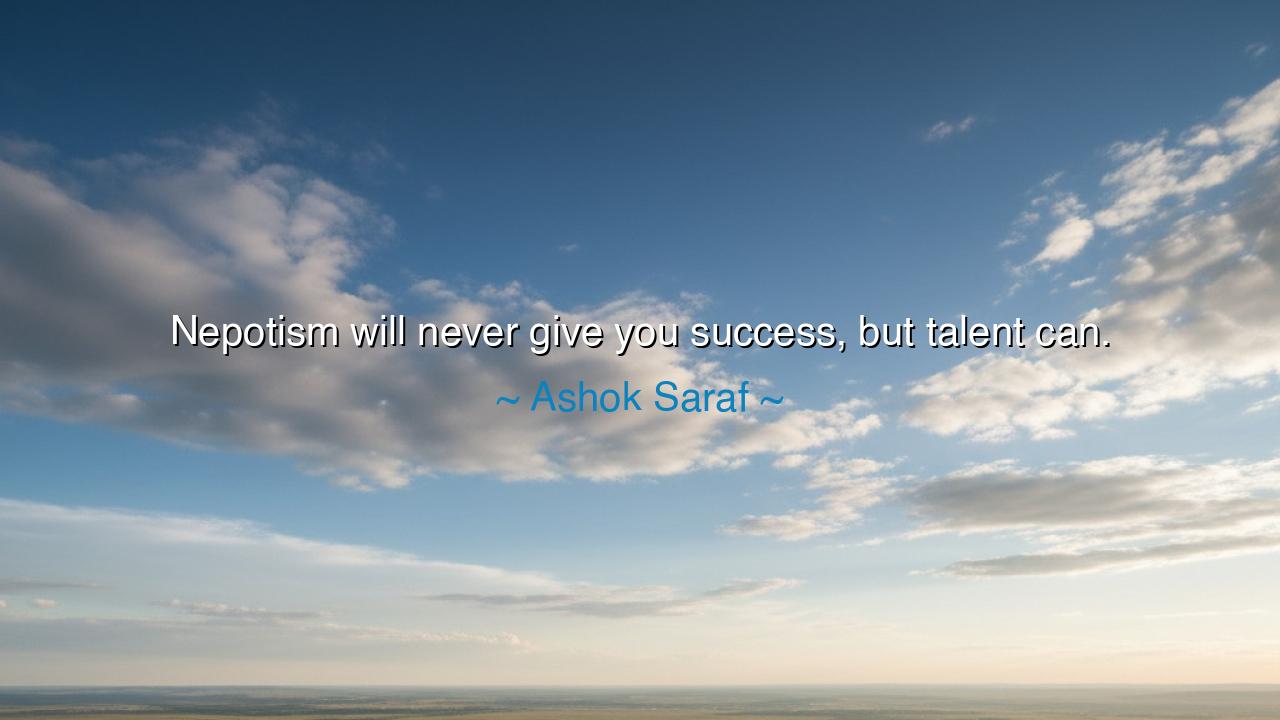
Nepotism will never give you success, but talent can.






"Nepotism will never give you success, but talent can." Thus declared Ashok Saraf, a voice forged in the fires of performance, who knew that lasting greatness cannot be inherited like gold, nor passed down like a family name. His words are both a warning and a call to courage: that false privilege may open doors, but only true ability will keep them from closing again. For in every age, the truth resounds—favor may lift a man, but only talent sustains him.
The origin of this wisdom lies deep in the chronicles of kings and empires. Many sons of mighty rulers inherited thrones through nepotism, but lacking virtue and skill, they squandered kingdoms built by wiser fathers. Think of Commodus, son of the great Marcus Aurelius, who received the empire of Rome but destroyed its dignity with weakness and excess. His success was borrowed, not earned, and so it dissolved into ruin. Contrast him with men like Alexander, who, though son of Philip, proved his own worth through genius in battle, carrying his own flame rather than resting in his father’s shadow.
So too in the realm of art and craft. History is filled with names forgotten, though they began with privilege, because their work carried no soul. Yet those who rise through the strength of talent alone leave marks upon eternity. Shakespeare was no nobleman’s son, yet his words became immortal. Beethoven had no inheritance, yet his music thundered through time. These names prove the eternal law: success is not bought, nor granted by kinship, but forged by the fire of one’s own gift.
The meaning of Saraf’s words is thus clear: nepotism may grant opportunity, but it cannot create greatness. It is talent, sharpened by discipline and tempered with perseverance, that transforms opportunity into true achievement. The one who relies on privilege alone will fade, for the world remembers not the lucky, but the worthy. But the one who cultivates his craft, who endures trial and struggle, will be exalted, for his works will testify long after his name is gone.
Consider Abraham Lincoln, born in poverty, with no family power to aid him. By sheer talent in oratory, wisdom in judgment, and resilience in character, he rose from log cabin to presidency, from obscurity to legend. His life stands as proof that the humblest beginning can yield the greatest success, if guided by talent and perseverance. Against him, countless men of noble birth have been swallowed by time, their names spoken only as footnotes of failure.
The lesson is eternal: do not envy those who rise by nepotism, for their height is fragile. Envy not the man who inherits a crown; envy the man who hammers his crown from iron with his own hands. Cultivate your gift, refine your skill, and trust that though your path may be longer, its foundation will be firmer. For privilege may place one on a stage, but only talent can hold the audience.
Practical wisdom calls us: seek your strength and sharpen it daily. Learn, practice, and persist. Do not wait for favors, for they make you weak; instead, hunger for mastery, for it makes you strong. When opportunities come, let your talent meet them, so that even if they vanish, your worth will create new ones. Remember: true success cannot be handed to you, for if it can be handed, it can be taken. True success must be earned, and once earned, it cannot be stolen.
Therefore, children of tomorrow, remember Ashok Saraf’s teaching: nepotism is a shadow, passing quickly and leaving no trace. Talent is a flame, burning bright and eternal. Do not chase shadows—build fire. For in fire lies light, and in light lies true success.






AAdministratorAdministrator
Welcome, honored guests. Please leave a comment, we will respond soon